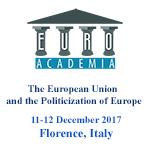Euroacademia Conferences
 Europe Inside-Out: Europe and Europeanness Exposed to Plural Observers (9th Edition) April 24 - 25, 2020
Europe Inside-Out: Europe and Europeanness Exposed to Plural Observers (9th Edition) April 24 - 25, 2020 Identities and Identifications: Politicized Uses of Collective Identities (9th Edition) June 12 - 13, 2020
Identities and Identifications: Politicized Uses of Collective Identities (9th Edition) June 12 - 13, 2020 8th Forum of Critical Studies: Asking Big Questions Again January 24 - 25, 2020
8th Forum of Critical Studies: Asking Big Questions Again January 24 - 25, 2020 Re-Inventing Eastern Europe (7th Edition) December 13 - 14, 2019
Re-Inventing Eastern Europe (7th Edition) December 13 - 14, 2019 The European Union and the Politicization of Europe (8th Edition) October 25 - 26, 2019
The European Union and the Politicization of Europe (8th Edition) October 25 - 26, 2019 Identities and Identifications: Politicized Uses of Collective Identities (8th Edition) June 28 - 29, 2019
Identities and Identifications: Politicized Uses of Collective Identities (8th Edition) June 28 - 29, 2019 The European Union and the Politicization of Europe (7th Edition) January 25 - 26, 2019
The European Union and the Politicization of Europe (7th Edition) January 25 - 26, 2019 7th Forum of Critical Studies: Asking Big Questions Again November 23 - 24, 2018
7th Forum of Critical Studies: Asking Big Questions Again November 23 - 24, 2018 Europe Inside-Out: Europe and Europeanness Exposed to Plural Observers (8th Edition) September 28 - 30, 2018
Europe Inside-Out: Europe and Europeanness Exposed to Plural Observers (8th Edition) September 28 - 30, 2018 Identities and Identifications: Politicized Uses of Collective Identities (7th Edition) June 14 - 15, 2018
Identities and Identifications: Politicized Uses of Collective Identities (7th Edition) June 14 - 15, 2018
Passage to a New Europe during the First World War
-
-

-
Presentation speakers
- Mats Andrén, Department of Literature, History of Ideas, and Religion, University of Gothenburg, Sweden
- Download presentation
Abstract:
It is well known that the First World War marks a passage to a Europe of nation states. Four empires dismantled and a dozen of new states declared their independence. In this paper, I argue that the transition in the mind goes step-wise, but that it has path-breaking consequences that still defines the thinking of Europe. The outbreak of the war was by many literates understood as a loss of a unified culture, while others kept recognizing a European culture or a common civilization. In the paper, I pay attention to wartime visions of a future Europe, mainly in Central Europe and Britain. Especially is followed the notion of a New Europe and its different implications regarding national self-determination. When H. G. Wells exclaimed ‘Nationalities will out’ during the First World War, the notion of self-determination was a controversial concept of key importance. Significantly, neither Wells nor many other supporters of similar declarations, backed wide spread national independence. Europe rather came out as a place of nation states only late at war and often reluctantly. However, some embraced it for offering an alternative to the Imperial system of Europe, hoping it should lay the ground for a new internationalism and for a Europe in peace. The paper rounds up with further comments on the outcome of the war and its impact on thinking Europe in a broader sense as well as on the European idea of a shared federation.
-
Related Presentations

What is the ‘Wright’ Modernism of the Mid-Century Cold War? American Design in Mid-Century Cold War Propaganda
- Heather Elisabeth

Please, Do Not Forget Eugenio Montale!
- Joseph R. Flicek













